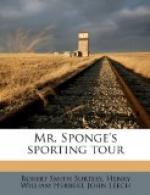At first he gave two or three great dinners a year, about the height of the fruit season, and when it was getting too ripe for carriage to London by the old coaches—when a grand airing of the state-rooms used to take place, and ladies from all parts of the county used to sit shivering with their bare shoulders, all anxious for the honours of the head of the table. His lordship always held out that he was a marrying man; but even if he hadn’t they would have come all the same, an unmarried man being always clearly on the cards; and though he was stumpy, and clumsy, and ugly, with as little to say for himself as could well be conceived, they all agreed that he was a most engaging, attractive man—quite a pattern of a man. Even on horseback, and in his hunting clothes, in which he looked far the best, he was only a coarse, square, bull-headed looking man, with hard, dry, round, matter-of-fact features, that never looked young, and yet somehow never get old. Indeed, barring the change from brown to grey of his short stubbly whiskers, which he trained with great care into a curve almost on to his cheek-bone, he looked very little older at the period of which we are writing than he did a dozen years before, when he was Lord Hardup. These dozen years, however, had brought him down in his doings.
The dinners had gradually dwindled away altogether, and he had had all the large tablecloths and napkins rough dried and locked away against he got married; an event that he seemed more anxious to provide for the more unlikely it became. He had also abdicated the main body of the mansion, and taken up his quarters in what used to be the steward’s room; into which he could creep quietly by a side door opening from the outer entrance, and so save frequent exposure to the cold and damp of the large cathedral-like hall




